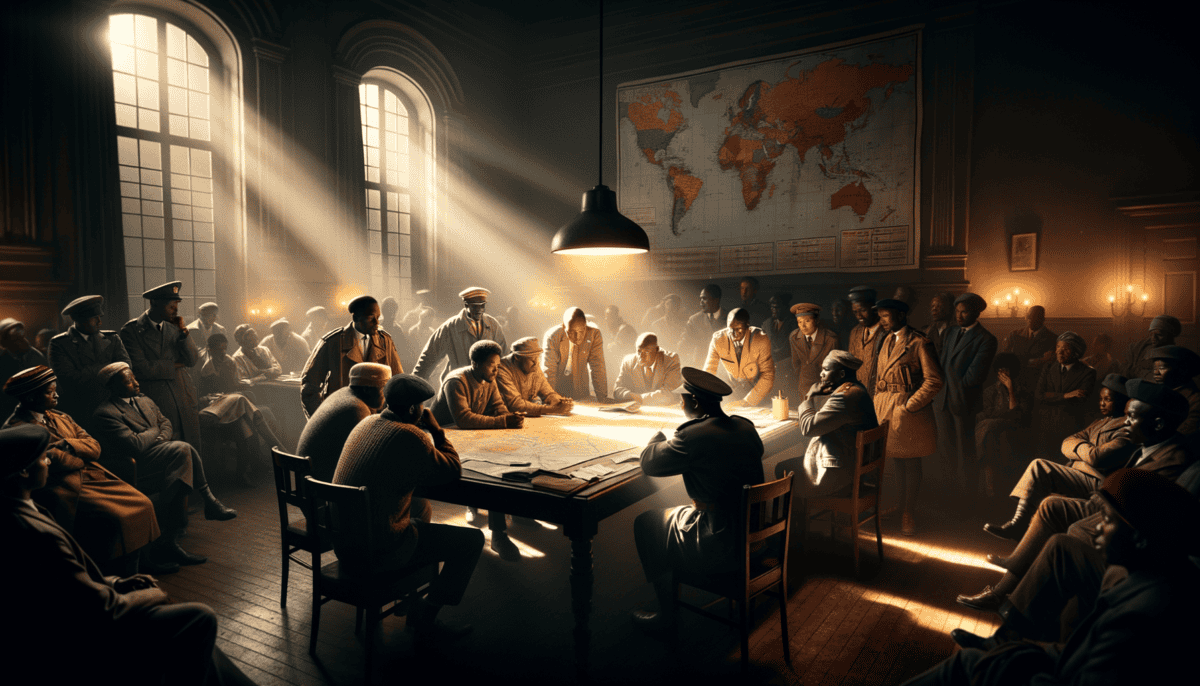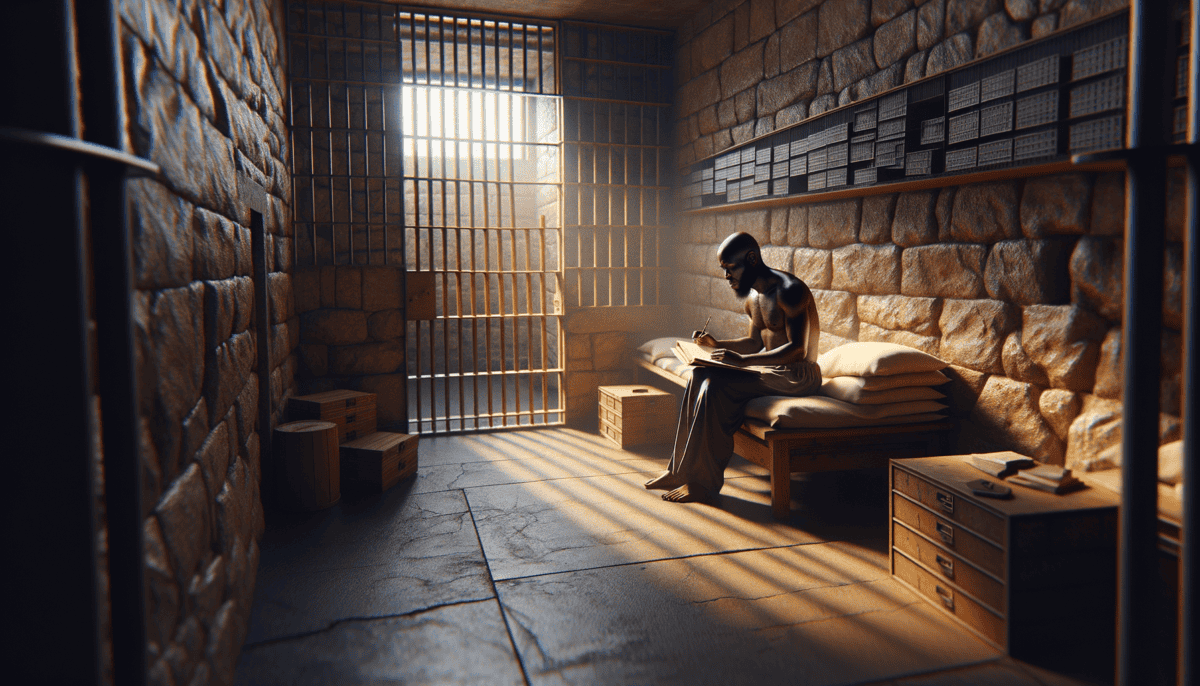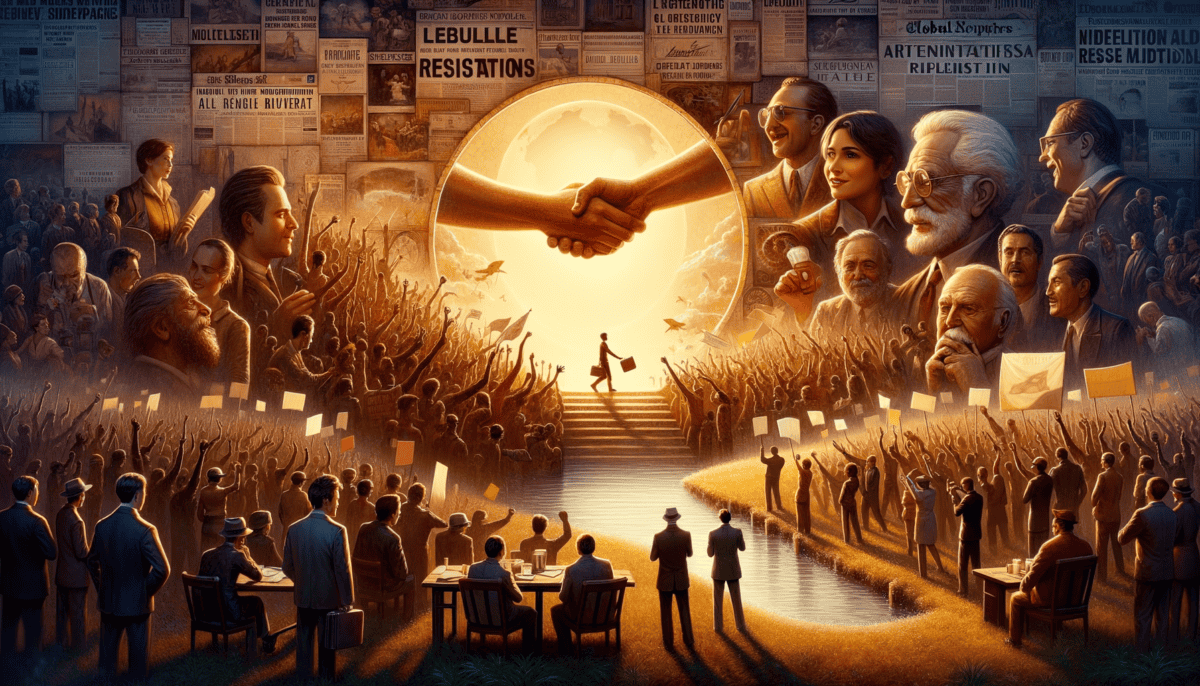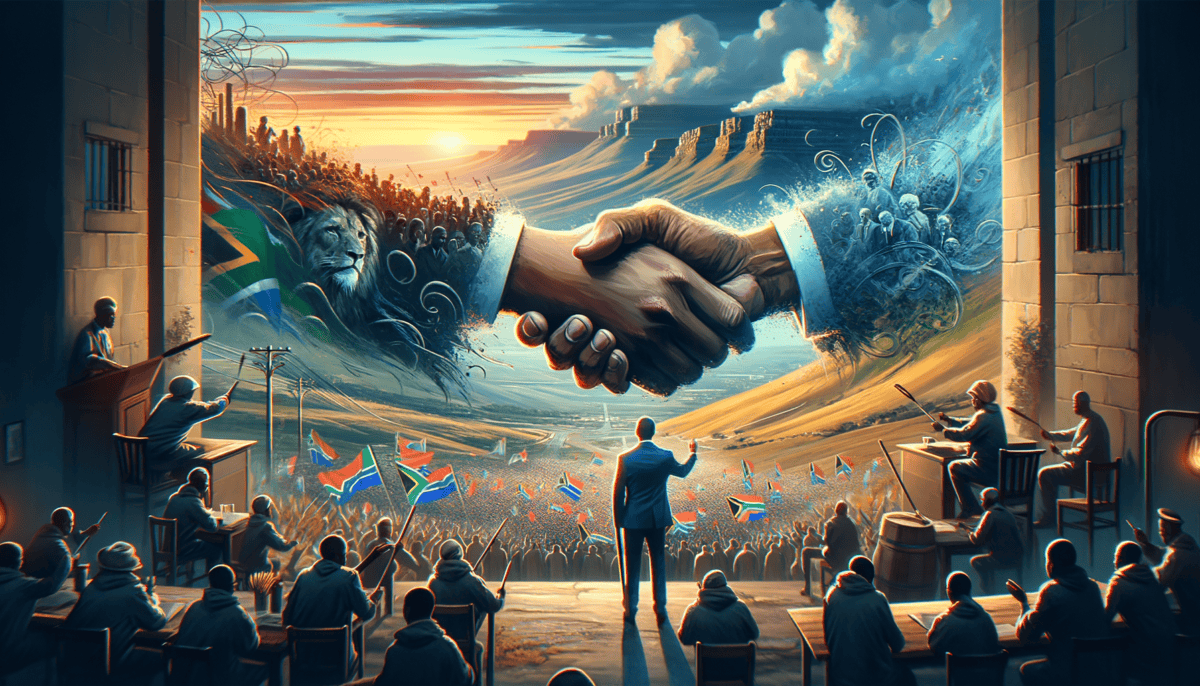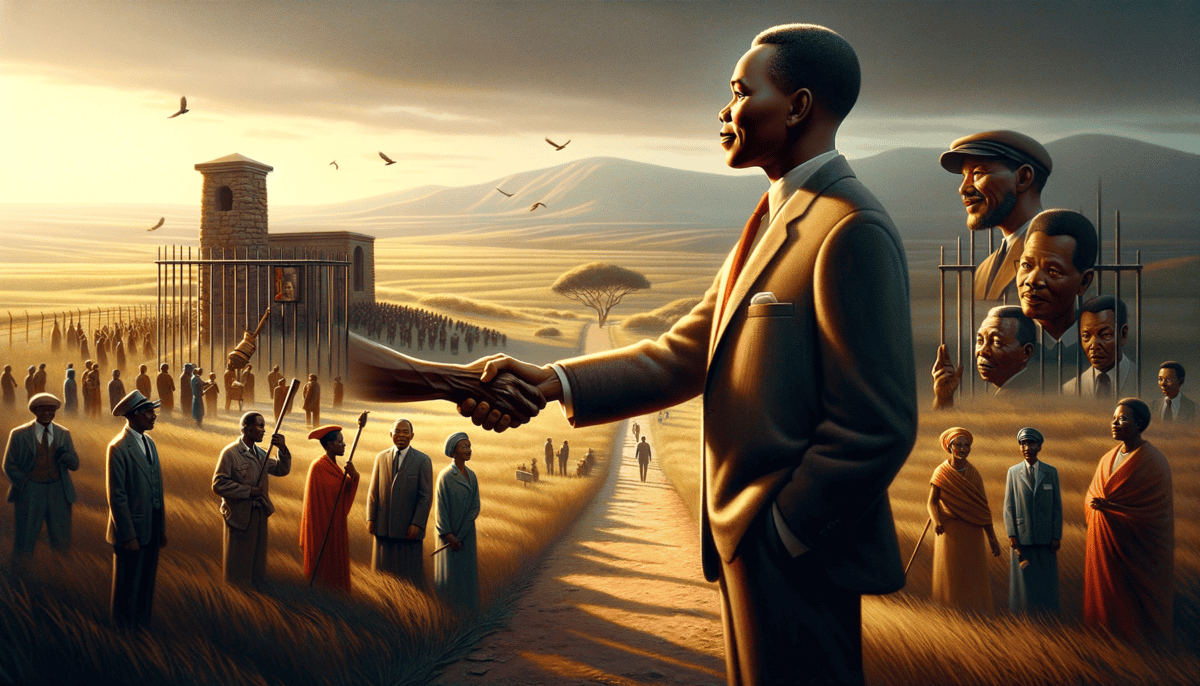Growing Up in Qunu
In a small village called Qunu, a special little boy named Nelson was born. The year was 1918, and his parents gave him a very special name – Rolihlahla. In his language, it meant "pulling the branch of a tree." But everyone would later know him as Nelson Mandela!
Young Nelson loved running through the green hills of Qunu with his friends. They played with toys made from nature – sticks became swords, and clay turned into animals. His home was a simple round house with a thatched roof, but it was filled with love and laughter.
Nelson's father was a chief who solved problems for the village people. Little Nelson would sit quietly and watch as his father listened to everyone's stories. He learned something very important – that everyone deserved to be heard, no matter who they were.
First Taste of School
When Nelson was seven years old, he became the first person in his family to go to school. He was so excited! But there was one big change – his teacher gave him the name "Nelson" on his first day. That's because in those days, all African children were given English names.
At school, Nelson wore his very first pair of pants – his father's old ones cut off at the knees! His classmates laughed, but Nelson held his head high. He loved learning and wanted to know everything about the world.
Learning About Unfairness
As Nelson grew older, he started to notice that not everyone was treated the same way. He saw that people with dark skin, like him, couldn't:
• Go to the same schools as white children
• Sit in the same areas on buses
• Go to the same restaurants or beaches
• Live in the same neighborhoods
This made young Nelson very sad and confused. Why should the color of someone's skin matter? He promised himself that one day, he would help make things fair for everyone.
Nelson moved to a bigger village called Mqhekezweni. There, he lived in a grand house with his uncle, who was an important chief. His uncle taught him about leadership and sent him to the best schools he could.
Young Nelson dreamed big dreams. He wanted to become a lawyer and help people who were treated unfairly. He studied hard and never gave up, even when things were difficult. Every night, he would look at the stars and imagine a future where everyone would be treated fairly.
“Sometimes it falls upon a generation to be great. You can be that great generation.” – These words would guide Nelson throughout his life.
The seeds of leadership were planted in those early years in Qunu. Young Nelson didn't know it yet, but he would grow up to change not just South Africa, but the whole world. His journey was just beginning, and the little boy from the rural village would become one of the greatest leaders the world has ever known.
Rising Against Unfairness
As Nelson grew older, he saw more and more unfair things happening in South Africa. The laws called “apartheid” made life very hard for people with dark skin. Nelson knew he had to do something to help.
Fighting Without Fighting
Nelson joined a group called the African National Congress (ANC). They wanted to change things peacefully at first. They would:
• Write letters to the government
• Hold peaceful marches
• Ask people not to buy from stores that treated them unfairly
• Sing songs about freedom
• Tell their stories to newspapers
A Brave Decision
But the government wouldn’t listen. They made even more unfair laws. Sometimes, they hurt people who were just asking to be treated fairly. This made Nelson very sad and worried.
After trying peaceful ways for many years, Nelson and his friends had to make a hard choice. They decided to fight back in a different way. They formed a new group called Umkhonto we Sizwe, which means “Spear of the Nation.” ️
“When peaceful ways don’t work, sometimes you have to stand up stronger for what’s right,” Nelson explained to his friends.
The Big Trial
The government didn’t like what Nelson and his friends were doing. In 1963, they caught Nelson and put him on trial. The courtroom was packed with people wanting to hear what would happen. ⚖️
Life Changes Forever
The judge sent Nelson to prison on an island called Robben Island. It was far away from his family and friends. The prison guards tried to make life hard for him, but Nelson stayed strong. ️
Even in prison, Nelson didn’t give up hope. He knew that one day things would change. He read books whenever he could. He talked to other prisoners about his dreams for South Africa. He even started a garden in the prison yard!
Nelson’s wife Winnie and his children missed him very much. They could only visit him a few times each year. But they kept fighting for freedom too, telling everyone about Nelson’s brave ideas.
People all around the world started to hear about Nelson. They couldn’t believe that someone so brave and good was locked in prison just for wanting everyone to be treated fairly. More and more people began asking for Nelson to be set free.
The prison walls were strong, but Nelson’s spirit was stronger. He knew that one day, he would walk out of prison and help make South Africa a better place. His fight for freedom was far from over, and his biggest challenges were still to come.
Life Behind Prison Walls
Nelson’s new home was a tiny cell on Robben Island. The cell was only as big as a small bathroom. It had a bucket, a small table, and a thin mat for sleeping. The walls were made of cold, gray stone.
Daily Life in Prison
Every morning, Nelson woke up very early. The guards made all the prisoners work in a big limestone quarry. The white rocks were so bright that they hurt Nelson’s eyes. His hands got sore from breaking rocks all day long.
Making the Best of Hard Times
Nelson turned his tiny cell into a classroom. He studied whenever he could. He taught other prisoners too! They called it “Mandela University.” These are some things they learned:
- Reading and writing
- History
- Different languages
- How to solve problems without fighting
- Ways to make peace
Growing Stronger
To stay healthy, Nelson exercised in his small cell. He would:
Do 100 push-ups
♂️ Do sit-ups and squats
Nelson also started a garden in the prison courtyard. He grew vegetables like tomatoes and onions. The garden taught him patience and hope. Just like his plants, good things take time to grow.
“Each morning when I saw my plants had grown a little bigger, I knew change was possible,” Nelson said.
Making Friends with Guards
At first, the prison guards were mean to Nelson. But he was always kind to them. He learned to speak their language, Afrikaans. He asked about their families. Slowly, many guards became his friends!
Letters from Home
Nelson could only get one letter every six months. He read each one over and over. He missed his family very much. When he felt sad, he would remember his children’s smiles.
Other prisoners looked up to Nelson. He helped them stay hopeful when they felt scared or lonely. He told them stories and made them laugh. Even in the darkest times, Nelson found ways to bring light. ⭐
While Nelson was in prison, more people around the world learned about him. They started fighting to set him free. Big changes were coming to South Africa, and Nelson would need all his wisdom and strength for what lay ahead.
A World Unites for Freedom
While Nelson sat in his tiny cell, something amazing was happening outside. People all around the world were learning about him!
Spreading the Word
Musicians wrote songs about Nelson. Students had big meetings to talk about him. Even kids made posters saying “Free Nelson Mandela!” The whole world was becoming his friend. ✨
Famous Friends Join the Fight
Important people started helping too! Presidents, movie stars, and singers all said the same thing: “Let Nelson go!”
“Nelson Mandela shows us that one brave person can change the world,” said many world leaders.
Special Ways People Helped
Here are some of the ways people fought for Nelson’s freedom:
- Big concerts where famous singers performed
- Sports teams refusing to play in South Africa
- Countries stopping business with South Africa
- Children writing letters to South African leaders
- People marching in the streets with signs
Changes Begin
The South African government started to feel the pressure. More and more people said the unfair rules had to change.
Hope Grows Stronger
People in South Africa got braver too. They had peaceful marches in the streets. They sang songs about freedom. They knew change was coming!
Messages of Support
Nelson started getting lots of letters in prison. People from all over wrote to tell him they cared. Some sent pictures their children drew. Others sent birthday cards.
Getting Ready for Change
The prison guards started treating Nelson differently. They let him have more visitors. They gave him a bigger cell. They knew he would be important for South Africa’s future.
“Freedom is coming,” people would say. “Nelson will help us build a new South Africa where everyone is treated fairly.”
The whole world watched and waited. Everyone knew something big was about to happen. Nelson had spent 27 years in prison, but his time there was almost over. A new chapter in South Africa’s story was about to begin. ⭐
A New Dawn of Freedom
On February 11, 1990, something amazing happened. After 27 long years, Nelson Mandela walked out of prison a free man!
The Big Day
People lined the streets to see Nelson. They danced and sang with joy! Nelson smiled and waved, raising his fist to say hello to everyone. It was like a giant party across South Africa!
Building Peace
Instead of being angry about his time in prison, Nelson wanted to make peace. He invited everyone – even people who had put him in jail – to help build a new South Africa. ️
“We must forget our past anger,” Nelson said. “Now is the time to work together and be friends.”
A Special Prize
The whole world was amazed by Nelson’s kindness. In 1993, he won a very special award called the Nobel Peace Prize. He shared it with F.W. de Klerk, who helped end the unfair rules.
Getting Ready to Vote
For the first time ever, all South Africans would be allowed to vote! Nelson traveled around the country, teaching people about voting. Many had never voted before. ✏️
Important Things Nelson Did:
- Helped write new fair laws
- Talked to people who disagreed with each other
- Taught people about peace
- Showed forgiveness to everyone
- Made everyone feel included in the new South Africa
Messages of Unity
Nelson had a special way of bringing people together. He wore the shirt of the South African rugby team, even though many black South Africans didn’t like rugby. He showed everyone how to be friends.
From Prison to Politics
Nelson worked very hard to get ready for his new job. He might become the president! He studied and learned about running a country.
Hope for the Future
People could feel that big changes were coming. The old unfair rules were going away. A new South Africa was being born, where everyone would be treated fairly.
“Our dreams are coming true,” people said. “Nelson is showing us the way to a better future.”
The whole country was getting ready for something that had never happened before – their first election where everyone could vote. Nelson Mandela, once a prisoner, was now ready to help lead his country to freedom. ⭐
Leading a Rainbow Nation
The big day finally arrived! On May 10, 1994, Nelson Mandela became South Africa’s first black president. Millions of happy people celebrated in the streets!
A Special Day
At the ceremony, Nelson wore a bright smile and a neat suit. Airplanes flew overhead, making pretty patterns with colored smoke. People from all over the world came to watch.
“Never, never again will this beautiful land experience the pain of being apart,” Nelson said in his first speech as president.
Healing the Country
Nelson had a big job to do. He wanted everyone to feel happy and safe in the new South Africa. He started something called the Truth and Reconciliation Commission. It helped people talk about the sad things that happened in the past. ️
A President for Everyone
Nelson worked hard to make all people feel special. He visited poor villages and rich cities. He played with children and talked to grown-ups. He showed that a president could be kind and friendly.
Things Nelson Did as President:
- Built new houses for poor people
- Made sure more children could go to school
- Helped sick people get medicine
- Made laws that were fair to everyone
- Brought sports teams together
Making Friends Around the World
People everywhere loved Nelson! Kings and queens, presidents and regular people all wanted to meet him. He traveled around the world sharing his message of peace. ✈️
Nelson’s Special Way
Even as president, Nelson stayed humble. He made his own bed every morning! He always had time to dance and joke with people. His smile could light up a whole room.
A Lasting Gift
When Nelson left office in 1999, he didn’t stop helping people. He worked to help children get better education and to help sick people get medicine. He kept spreading love and kindness until he passed away in 2013.
Today, people remember Nelson Mandela as someone who changed the world with love instead of hate. His story teaches us that one person can make a big difference.
The Legacy Lives On
Nelson Mandela’s story shows us that good can win over bad. He taught us that forgiveness is stronger than anger. His life reminds us that we should never give up on our dreams, no matter how hard things get. ⭐


